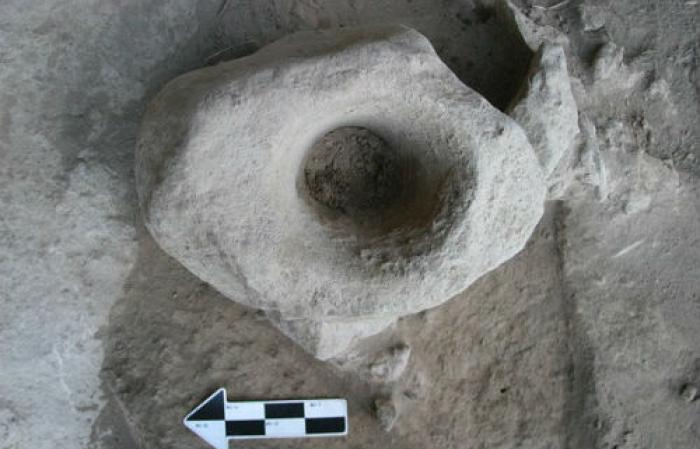The Ceremonial Sounds that Accompanied Our Ancestors’ Funerals, 15,000 Years Ago
 They decorated graves with flowers, held ceremonial meals before their funerals, and – as a new study from the University of Haifa now shows – the Natufians who lived in our region 15,000 – 11,500 years ago also created massive mortars that were used to pound food at their burial ceremonies. The pounding sound of these large mortars informed the members of the community that a ceremony was underway. “The members of the Natufian culture lived during a period of change, and their communal burial and commemorative ceremonies played an important role in enhancing the sense of affiliation and cohesion among the members of the community,” explain Dr. Danny Rosenberg and Prof. Dani Nadel, from the Zinman Institute of archaeology who undertook the study.
They decorated graves with flowers, held ceremonial meals before their funerals, and – as a new study from the University of Haifa now shows – the Natufians who lived in our region 15,000 – 11,500 years ago also created massive mortars that were used to pound food at their burial ceremonies. The pounding sound of these large mortars informed the members of the community that a ceremony was underway. “The members of the Natufian culture lived during a period of change, and their communal burial and commemorative ceremonies played an important role in enhancing the sense of affiliation and cohesion among the members of the community,” explain Dr. Danny Rosenberg and Prof. Dani Nadel, from the Zinman Institute of archaeology who undertook the study.


 The “Baron de Rothschild’s Ship” was one of three ships used to carry raw materials from France to a glass factory established by the baron at Tantura. The ship vanished without a trace in the late nineteenth century. Has it now been found more than a century later? In a new study, researchers from the Leon Recanati Institute for Maritime Studies seek to show that a shipwreck discovered at Dor Beach in 1999 may be identified as the missing Baron’s Ship. “We know that two of the baron’s three ships were sold, but we have no information concerning the third ship. The ship we have found is structurally consistent with the specifications of the Baron’s ships, carried a similar cargo, and sailed and sank during the right period,” explained Dr. Deborah Cvikel and Micky Holtzman, who are investigating the shipwreck
The “Baron de Rothschild’s Ship” was one of three ships used to carry raw materials from France to a glass factory established by the baron at Tantura. The ship vanished without a trace in the late nineteenth century. Has it now been found more than a century later? In a new study, researchers from the Leon Recanati Institute for Maritime Studies seek to show that a shipwreck discovered at Dor Beach in 1999 may be identified as the missing Baron’s Ship. “We know that two of the baron’s three ships were sold, but we have no information concerning the third ship. The ship we have found is structurally consistent with the specifications of the Baron’s ships, carried a similar cargo, and sailed and sank during the right period,” explained Dr. Deborah Cvikel and Micky Holtzman, who are investigating the shipwreck
 Prof. Uri Shanas of the University's Oranim campus has launched an unusual new initiative: a massive, international, and democratic “purchase group” open to all that aims to save the Earth. “It is neither possible nor necessary to conserve the entire planet all the time,” Prof. Shanas explains. “But if we manage to conserve even a small percentage that is home to an unusual diversity of plant and animal life in danger of extinction, we can go some way to halting the current process of species extinction.” Prof. Shanas is using the crowdsourcing technique to raise the funds needed to launch the initiative.
Prof. Uri Shanas of the University's Oranim campus has launched an unusual new initiative: a massive, international, and democratic “purchase group” open to all that aims to save the Earth. “It is neither possible nor necessary to conserve the entire planet all the time,” Prof. Shanas explains. “But if we manage to conserve even a small percentage that is home to an unusual diversity of plant and animal life in danger of extinction, we can go some way to halting the current process of species extinction.” Prof. Shanas is using the crowdsourcing technique to raise the funds needed to launch the initiative. A groundbreaking new study at the University has found, for the first time, that emotions are not only the product of the processing of information by the brain, but that they also directly influence processes of learning and memory in the brain. Dr. Shlomo Wagner of the Sagol Department of Neurobiology, who undertook the study, explains: “It turns out that different emotions cause the brain to work differently and on distinct frequencies.”
A groundbreaking new study at the University has found, for the first time, that emotions are not only the product of the processing of information by the brain, but that they also directly influence processes of learning and memory in the brain. Dr. Shlomo Wagner of the Sagol Department of Neurobiology, who undertook the study, explains: “It turns out that different emotions cause the brain to work differently and on distinct frequencies.”